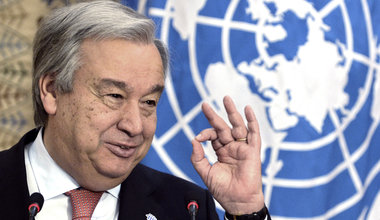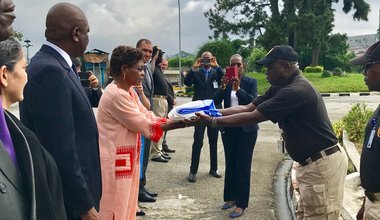PRESS REVIEW FOR MONDAY, 31 MAY 2010
Cote d'Ivoire is a powder keg
that could ignite
L'intelligent d'Abidjan –
The members
of the United Nations (UN) Security Council, on Thursday, 27 May 2010,
unanimously voted resolution 1924 prolonging UNOCI's mandate in Côte d'Ivoire
until 30 June 2010. The Secretary-General of the institution, Ban-Ki Moon, said,
during the sessions, that he was disappointed by the impasse facing the Ivorian
electoral process. Here is the resolution on Côte d'Ivoire.
(...) REPORT BY THE
SECRETARY-GENERAL REGARDING THE UNITED NATIONS OPERATION IN CÔTE D'IVOIRE
(UNOCI)
The Secretary-General, Mr. Ban
Ki-Moon, in the report, outlines the principal events that occurred in the
country since his previous report issued on 7 January 2010 and presents the
options, recommendations and criteria required by the Security Council. He
recommends maintaining the number of the military and police components of the
United Nations Operation in Côte d'Ivoire (UNOCI) at the same level until late
2010 in order to give the country the opportunity to complete the last phase of
the elections with the full support of the United Nations. It is clear, writes
Mr. Ban, that the country remains a powder keg that could ignite at any moment
if the deep causes of the conflict are not treated. The population's well-being
continues to deteriorate because of increasing poverty, lack of employment and
the difficult access to the basic social services, which could result in civil
disturbances. (...)
Sakassou – A peace committee
created by UNOCI
Le Jour Plus–
A peace committee in
charge of resolving the conflicts in the Lycée Moderne of Sakassou, situated 200
km north of Abidjan, was created on Thursday, 27 May, at the end of a monitoring
workshop organized by the United Nations Operation in Côte d'Ivoire (UNOCI).
According to Kei Tagawa of UNOCI's Civil Affairs section, the workshop, which
took place after a conflict between school children and their teachers, was
aimed at helping the participants to be actors for social cohesion. "This
activity is the logical continuation of the School Caravan of 24 March. The
disturbances which occurred during the past weeks at the Lycée and the many
requests for the rehabilitation of infrastructures from the administration
induced UNOCI to initiate the training", he said. The newly-formed committee for
the resolution of conflicts is composed of representatives of the
administration, teachers, school children and their parents. The creation of the
committee was welcomed by the Secretary-General of Sakassou Prefecture, Djezou
Konan, who stressed that the Lycée should no longer experience confrontations
between teachers and school children. "The peace committee should fully play its
role in order to establish social cohesion between all the actors in education
in Sakassou", he underlined. (...)
Laurent Gbagbo on RFI,
yesterday: "What remains to be done before elections"
Le Nouveau Réveil –
The Ivorian Head of State, Laurent Gbagbo, was RFI's guest yesterday morning.
President Gbagbo disclosed his feeling regarding the ADB's General Meetings in
Côte d'Ivoire and the crisis facing the country since 2002. Once again he
accused President Chirac and Prime Minister De Villepin of "having attempted to
overthrow his regime. Here is his interview. (...)
RFI:
Mr. President, when you ask « what do you want me to do », we could respond,
election, for example.
Laurent Gbagbo:
Yes, elections will be
held by Ivorians for Ivorians, when Ivorians are ready. I am always astonished
when people come and question me as if they were more concerned about Ivorian
elections than us. It is funny. (...)
RFI:
As a politician and President
of the Republic, what timetable would you like for the elections?
Laurent Gbagbo :
It is not about what I want.
It is about what has
to be done. And
what has to be done is in the process of being done. We will have elections
before the end of 2010.
What remains to be
done? For the
moment, the Prime Minister has started checking the provisional electoral list
since 27 May.
It must be checked.
There have been cases of
simple appeals, there have been cases of complicated appeals which have to go to
court. After that the country must be reunited by establishing customs posts
along the border, by handing over power to manage the districts to the prefects,
etc...These are the two things which are the main things that have to done.
We are in the
process of doing the.
RFI :
Mr. President, you say the electoral list must be
checked.
Has everyone in the opposition and the presidential majority how this list
should be checked?
Laurent Gbagbo:
I don't know. The Prime Minister is gathering advice from the left and right in
order to decide how it will be done. He could find a way which is agreeable to
everyone. This is what he looking for now. Are we going to have a consensus?
That I cannot say because it is not my job. It is the Prime Minister's job. When
he has found a solution, he will tell us.
RFI: Mr. President, there is
the issue of the electoral list and then there is the issue of reunification.
When one talks about reunification, it also means the reunification of the army.
Where are you on the issue of disarmament? Because it seems as if things are not
progressing.
Laurent Gbagbo:
Madame, why are you asking me this question, I'm not in charge of this issue.
It is
true that it is of interest to me. I have done my part.
I have signed a decree to
integrate into the national army those who came before 2000. I have already
integrated them. I even gave them the balance of their salaries and posts in
line with their brothers in arms. This was up to me to do and I did it. I'm
making progress with regard to the reunification of the army. I'm waiting for
the work to be done on the ground in order to move on to the next stage. That is
to say that the next stage is the real reintegration and deployment of existing
units. I'm waiting for them to make me a proposition and the Prime Minister is
working on that. (...)
Revealed – What Gbagbo accuses France of.
L'Intelligent d'Abidjan -
Laurent Gbagbo is not angry with Sarkozy but Sarkozy is having to
suffer from his anger. The head of state refuses to accept the invitation from
the French head of state. Even though since his arrival, the French President
has worked to put the past behind and concentrate on the positive, Laurent
Gbagbo insists that the dispute linked to the management of the Ivorian crisis
by Jacques Chirac and Dominique de Villepin has to be discussed and resolved
first. But deep down what is all about, what is the Ivorian chief accusing
Chirac and Villepin of? Laurent Gbagbo accuses France of having refused to
accept that the rebellion was an attack against the territorial integrity of
Côte d'Ivoire, and for this reason had refused to implement the defence
agreement to help a democratically elected regime. For this reason, Laurent
Gbagbo has always been convinced that the hand of the French service was behind
rebellion against his regime.......
(...)
Rififi to PDCI-RDA: Militants
demand the head of Bédié and insist on a new congress.
L'Inter
There is noise once again at
the PDCI-RDA. Just when we are joyfully moving towards elections which were
expected for the past for half decade, activists of this 60-year-old party have
thrown open a debate which risks hitting the bull's eye still within this
political group, in coming days and weeks. With supporting arguments, these
militants, in the diaspora, no longer want Henri Konan Bédié as the head of
their party. Individually, they produced statement, copies of which were sent to
us to promote their ideas and invite their comrades to follow them. Presenting
himself as a PDCI militant residing in Los Angeles, California, Aimé Bonsense
criticises the fact that President Bédié is too old to leader the PDCI-RDA and
take the party to victory at the nest elections «Since the death of founding
father Félix Houphouët-Boigny, our party has been divided because of our leaders
who refuse to change. Are we in the process of practicing old Akan tradition
which says that we should never change a chief while he is still alive? If this
is the case we would like to humbly draw the attention of the leaders of our
party to that fact that the world has evolved. In addition, why do we insist on
maintain president Bédié as the head of the PDCI RDA? What does he still have to
prove at the age of 76? (...) So the time has come to go on a well-deserved
retirement because it is time that a younger person leads the party if we want
to win the next elections. (...) ».
 ONU
ONU Nations Unies Maintien de la paix
Nations Unies Maintien de la paix



